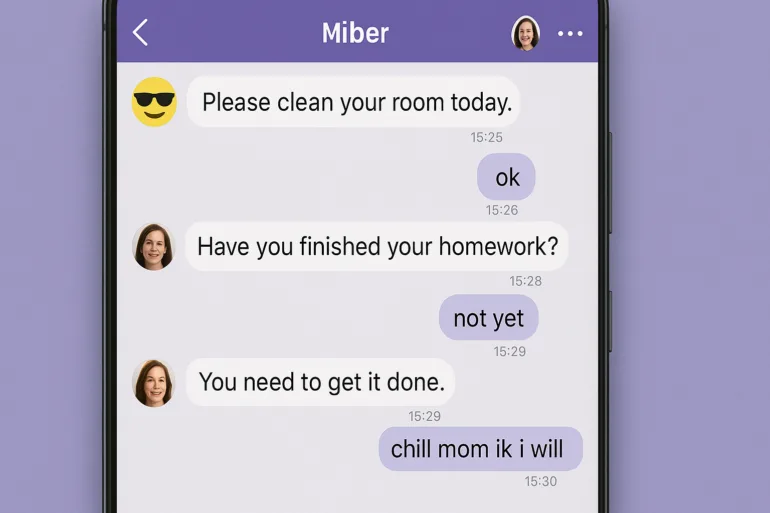If you've recently received a text from your children, younger relatives, or a young coworker without a single capital letter, no period, and a few suspiciously casual "lol" additions, you're not alone. This writing style, which not long ago would have been labeled lazy or illiterate, is now becoming the new norm in everyday communication. It sounds like a mistake, but it's actually a very conscious decision by Generation Z, who send a message with every lowercase letter: I don't need to try to be understood - just be real with me.
This is more than just a typing economy or a rebellion against rules. It is a complete reversal in the perception of language, which this generation no longer sees as a set of rules, but as a tool for expressing tone, authenticity, and point of view. Writing with lowercase letters, no punctuation, abbreviations, and internet slang, it has become a kind of digital dialect. For some, it is an endangerment of the language, for others, a sign of evolution. But if we want to understand where we are going, we must first understand, Why did the crown fall off the head of the capital letters?.

Gen Z and the quiet revolution of lowercase letters
What is it about capital letters that Gen Z has written them off so quickly?
First of all – communication Today it's no longer a form, but a feelingWhen young people write without capital letters, they are communicating that they are relaxed, genuine, and not trying to sound like some artificial version of themselves. Formality means distance for them, coldness, almost robotic. Writing in the style of “Hello” with all the correct letters sounds like you’re wearing a suit for an interview – and in the TikTok world, that’s simply not in fashion anymore.
Second time – capitalization requires more effort. Physical and mental. On the phone, you have to click an extra key, press “shift,” and if you’re in a hurry, why bother? Besides, many people already type so fast that every extra key would seem like an unnecessary detour. Writing should be fluent, natural and without interruptions – the letter should just slip from the thought into the message.

Language as an expression of identity
For Gen Z, language is visual style, almost like a fashion statement. Just like you choose a minimalist color palette for your Instagram profile, you choose lowercase as an aesthetic decisionIt's not so much what you say, but how it looks. And there's a lot of meaning in that "how": lowercase letter means closeness, accessibility, sincerity.
This makes “hey” in lowercase letters friendly and homely, while “Hey” can seem formal, even lofty. The difference is subtle – but it is felt. In an age where digital communication replaces face-to-face conversation, these little things become key to understanding tone.
Brands are already following
It is no surprise that they are also big brands quickly grabbed the signalWriting in lowercase is no longer just “cool” – it’s marketing strategyMore and more companies are choosing to rebranding in all lowercase letters, as it signals that they are no longer distant corporations, but part of the conversation. This way, companies present themselves as “your friends” and no longer as “your service provider.”
Product names, descriptions on packaging, playlist names on platforms – everything is becoming softer, more organic, more human...and more in line with the language used by the new generation.
Where is the limit?
However, this is not a trend that can be simply transferred to all environments. Where they are important trust, professionalism and clarity, capitalization and proper punctuation will remain the standard for a long time to come. In the worlds of finance, healthcare, or law, an entire email without a single capitalization would sound at the very least frivolous – if not a little suspicious.
This is where it comes to the fore. generational conflict: Older generations interpret this type of writing as unprofessional, even disrespectful. Younger ones wonder why exclamation points and periods are so important if the message gets through. Both sides have their arguments – the problem arises when they don't want to hear them from each other.

What to do when Gen Z sends you “ok. sure. whatever”?
If you're not used to this style, these types of messages can work short, cold, or even passive-aggressiveBut they often mean the exact opposite – especially if they come from a generation that sees punctuation primarily as tension and pretentiousness.
The best tactic?
- Breathe.
- Don't direct anger where it doesn't exist.
- Ask if you're not sure.
And even though it may seem strange, responding in the same tone can create a more relaxed relationship. It may not be the end of the world if you say “cool” instead of “Okay, thanks for the info.” Sometimes it’s just a little something that makes a big difference.
And what if they don't write at all anymore?
Now comes the plot twist: Gen Z writes less and less. Why type when you can send a voice message, video, or emoji reaction? Messaging is moving from written to audio and visual. No rules, no grammar – just expression. This is a new form of sincerity: you speak as if you were sitting across from them.
But ironically – despite their dislike of capital letters, they don't even like calls. Don't call them, really. Send a voice message. It's a new form of reflection: time to prepare, no pressure, no obligation to respond immediately.
Writing doesn't end – it just transforms.
No, capital letters won't disappear from textbooks tomorrow. But if we rely solely on them as a symbol of professionalism, we'll miss the point of the future of language. Writing is moving—and not necessarily down. Just elsewhere. To a world where every letter will be part of a personal expression, not a grammatical command.
And as long as the message is clear, it doesn't matter what letter it starts with.
or is it?






